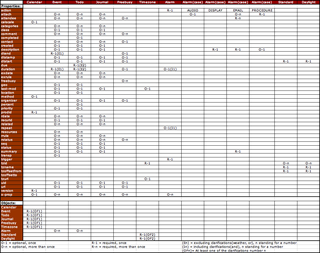Related Research Articles
While Hypertext Markup Language (HTML) has been in use since 1991, HTML 4.0 from December 1997 was the first standardized version where international characters were given reasonably complete treatment. When an HTML document includes special characters outside the range of seven-bit ASCII, two goals are worth considering: the information's integrity, and universal browser display.
Multipurpose Internet Mail Extensions (MIME) is an Internet standard that extends the format of email messages to support text in character sets other than ASCII, as well as attachments of audio, video, images, and application programs. Message bodies may consist of multiple parts, and header information may be specified in non-ASCII character sets. Email messages with MIME formatting are typically transmitted with standard protocols, such as the Simple Mail Transfer Protocol (SMTP), the Post Office Protocol (POP), and the Internet Message Access Protocol (IMAP).

Wireless Markup Language (WML), based on XML, is a now-obsolete markup language intended for devices that implement the Wireless Application Protocol (WAP) specification, such as mobile phones. It provides navigational support, data input, hyperlinks, text and image presentation, and forms, much like HTML. It preceded the use of other markup languages used with WAP, such as XHTML and HTML itself, which achieved dominance as processing power in mobile devices increased.
This page provides an index of articles thought to be Internet or Web related topics.

Windows-1252 or CP-1252 is a single-byte character encoding of the Latin alphabet, that was used by default in e.g. Microsoft Windows for English and many (European) languages including Spanish, Portuguese, French, and German. This character-encoding scheme is used throughout the Americas, Western Europe, Oceania, and much of Africa. Windows now uses Unicode character sets by default.
DICT is a dictionary network protocol created by the DICT Development Group in 1997, described by RFC 2229. Its goal is to surpass the Webster protocol to allow clients to access a variety of dictionaries via a uniform interface.

The Internet Calendaring and Scheduling Core Object Specification (iCalendar) is a media type which allows users to store and exchange calendaring and scheduling information such as events, to-dos, journal entries, and free/busy information, and together with its associated standards has been a cornerstone of the standardization and interoperability of digital calendars across different vendors. Files formatted according to the specification usually have an extension of .ics. With supporting software, such as an email reader or calendar application, recipients of an iCalendar data file can respond to the sender easily or counter-propose another meeting date/time. The file format is specified in a proposed Internet standard for calendar data exchange.
XForms is an XML format used for collecting inputs from web forms. XForms was designed to be the next generation of HTML / XHTML forms, but is generic enough that it can also be used in a standalone manner or with presentation languages other than XHTML to describe a user interface and a set of common data manipulation tasks.
In the context of an HTTP transaction, basic access authentication is a method for an HTTP user agent to provide a user name and password when making a request. In basic HTTP authentication, a request contains a header field in the form of Authorization: Basic <credentials>, where credentials is the Base64 encoding of ID and password joined by a single colon :.

Digest access authentication is one of the agreed-upon methods a web server can use to negotiate credentials, such as username or password, with a user's web browser. This can be used to confirm the identity of a user before sending sensitive information, such as online banking transaction history. It applies a hash function to the username and password before sending them over the network. In contrast, basic access authentication uses the easily reversible Base64 encoding instead of hashing, making it non-secure unless used in conjunction with TLS.
Calendaring Extensions to WebDAV, or CalDAV, is an Internet standard allowing a client to access and manage calendar data along with the ability to schedule meetings with users on the same or on remote servers. It lets multiple users in different locations to share, search and synchronize calendar data. It extends the WebDAV specification and uses the iCalendar format for the calendar data. The access protocol is defined by RFC 4791. Extensions to CalDAV for scheduling are standardized as RFC 6638. The protocol is used by many important open-source applications.

XMLHttpRequest (XHR) is an API in the form of an object whose methods transfer data between a web browser and a web server. The object is provided by the browser's JavaScript environment. Particularly, retrieval of data from XHR for the purpose of continually modifying a loaded web page is the underlying concept of Ajax design. Despite the name, XHR can be used with protocols other than HTTP and data can be in the form of not only XML, but also JSON, HTML or plain text.
Kolab is a free and open source groupware suite. It consists of the Kolab server and a wide variety of Kolab clients, including KDE PIM-Suite Kontact, Roundcube web frontend, Mozilla Thunderbird and Mozilla Lightning with SyncKolab extension and Microsoft Outlook with proprietary Kolab-Connector PlugIns.
ISO-8859-8-I is the IANA charset name for the character encoding ISO/IEC 8859-8 used together with the control codes from ISO/IEC 6429 for the C0 and C1 (80–9F) parts. The characters are in logical order.
A proxy auto-config (PAC) file defines how web browsers and other user agents can automatically choose the appropriate proxy server for fetching a given URL.
The Sun Java System Calendar Server was Sun's calendar (scheduling) server. The currently available version is 6.3 which is now part of the Sun Java System Communications Suite.
The MySQLi Extension is a relational database driver used in the PHP scripting language to provide an interface with MySQL databases.
DAViCal is a server for calendar sharing. It is an implementation of the CalDAV protocol which is designed for storing calendaring resources on a remote shared server. Although the events are stored in a SQL database the information between client and server is transferred in the iCalendar format.